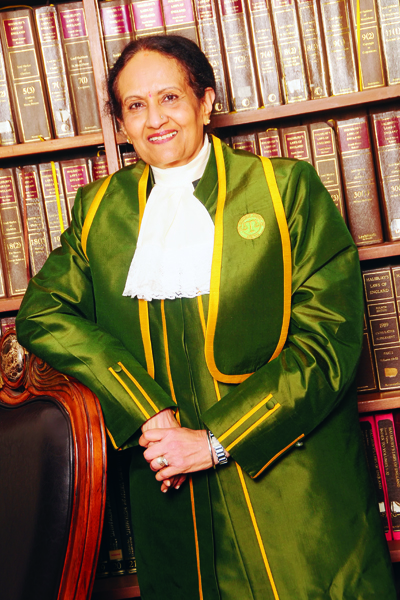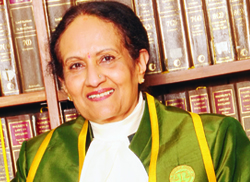
Lady Justice Kalpana Rawal defied all odds to become the first Asian and first woman in Kenya to start a legal practice. She is also the first woman of Asian descent to be appointed to the High Court Bench, the Court of Appeal, and as Deputy Chief Justice and Vice President of the Supreme Court.
Despite her calm demeanour, retired Justice Kalpana Rawal has made history in the judicial system and helped set precedents in areas of law that today make the foundations of our legal principles and legislation including, Constitutional Law, Criminal Law and Family Law.
Rawal, who grew up in India, comes from a strong pedigree of lawyers. Her grandfather was the Deputy Law Minister and her father was a judge.
The nature of her father’s work, which had him transferred constantly, saw Rawal and her siblings changing schools every so often. After she finished school, she attended St Xavier College, where she was offered a full scholarship to pursue a degree course in law, thanks to her stellar academic performance.
Words of Wisdom
- Be strong, confident, straightforward, honest, dedicated and steadfast.
- Do not do things for the glory of it or to merely boost your ego; you are a trustee of Kenya. “Stay true to your oath.
- There will always be people trying to drag you down. Find the grace to stay on top.
Rawal credits her parents with playing a great role in shaping the woman that she is today. Both were well educated. “She [her mother] believed in girls being independent and empowered, while my father valued education so much that he shunned the idea of any of us, my four sisters and I, being subjected to dowry. He always reiterated that the education he accorded us is dowry enough.”
On completing her law degree, Rawal received a gold medal in the bar examination in 1968 from the Gujarat Bar Association. She had scored the highest marks in her class. She then joined a renowned constitutional lawyer in the State of Gujarat as a junior counsel. The experience shaped Rawal’s interest in Constitutional Law, which remained alive throughout her professional life.
Rawal was also mentored by the then Chief Justice of the Gujarat High Court who had noticed her commendable work as a junior counsel. She describes the experience as ‘humbling’. “He would invite me to his chambers for words of guidance and encouragement. Those meetings shall remain in my memory as the most rewarding, fulfilling and inspirational moments that helped shape my career.”
In 1973 after getting married, Rawal migrated to Kenya with her husband. She was admitted to the Roll of Advocates as an Advocate of the High Court of Kenya in 1975. She immediately started her own legal practice under the name K. H. Rawal Advocates, becoming the first sole female lawyer to set up a private practice in Kenya.
After 24 years of private practice, Chief Justice Zacchaeus Chesoni offered her the position of Commissioner of Assize to help the judiciary clear the backlog of cases that had piled up in the courts. She accepted the offer and was sworn in on June 2, 1999. Although it was a new challenge for the career barrister, it was it was one she was happy to embrace.
The following year Rawal was sworn in as a Judge of the High Court of Kenya. “I was then transferred to the Civil Division and appointed to sit on a number of constitutional benches. These opportunities opened doors for me to help develop the body of Constitutional Law in Kenya, which was still in its infancy.”
As a High Court judge, she also had the pleasure of serving in the Civil, Criminal, Family, Environmental and Land Law divisions. Rawal acquired the reputation among her peers as the judge who never deferred a date for delivery of judgments. She always kept time.
In 2010, Rawal was appointed as the Liaison Judge for Kenya, a position that accorded her membership to the International Hague Network of Judges. “When the Honourable Chief Justice [Mathew Alexander Thorpe] appointed me to assist the International Criminal Court (ICC) in taking evidence of 10 security officers in respect to the post-election violence of 2007–2008, I was happy to take up the challenge in the then untested field of International Criminal Law.”
In her capacity as Liaison Judge, she helped with expeditious promulgation of the Rules of Procedure as set out in the International Crimes Act, which led to groundbreaking court decisions regarding the resistance of the named witnesses to give evidence.
Rawal was elevated to Judge of the Court of Appeal in 2012. During her tenure, she was appointed chairperson of the Commission of Inquiry into the accident involving the helicopter which crashed in the Ngong Forest, killing Internal Security Minister George Saitoti, his assistant Orwa Ojodeh, the pilot and several other police officers.
During the same year, she was also awarded the Elder of the Order of the Burning Spear in recognition of her service to the nation as a judicial officer. In 2013, Rawal was sworn in as Deputy Chief Justice of Kenya.
Rawal considers her greatest challenge to be her transition from a career lawyer to a judicial officer in the 1990s. She says that she felt like a fish out of water. It was difficult for her to build her reputation as an honest and impartial judge at a time when the Judiciary faced many corruption allegations.
She will forever be grateful to retired judge, Lady Justice Effie Owuor, and Lady Justice Joyce Aluoch. The two long-time judges encouraged Rawal to solder on when she started her legal practice in Kenya.
A highly spiritual woman, Rawal describes prayer as an important element in her life. “It keeps me inspired,” she says. She lists sincerity, honesty and dedication as values that are deeply ingrained in her life. The judge, who has always had an open-door policy, says: “I’m always happy to give advice to anyone who needs my assistance.”
Rawal’s proudest accomplishment is that she has been able to give judgments that have set precedents in the Kenyan judicial system, judgments that are highly valued to date by members of the Bench and of the Bar. Her dream for the future of the Judiciary is to see a vibrant and dedicated Judiciary that is respected by all.
Her hope is that Kenyans will try to understand the challenges judges face as officers of the court to ensure impartial administration of justice.
In between her work and family, the top judge managed to find time to mentor young lawyers in her chambers.
Her social life was almost non-existent, especially when she served on the bench. She, however, loves reading spiritual and legal books in her spare time. She confesses that she is not as outgoing as people may imagine, and enjoys some quiet time.
Rawal retired from the judiciary in 2016
